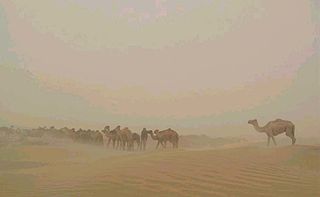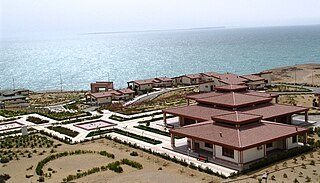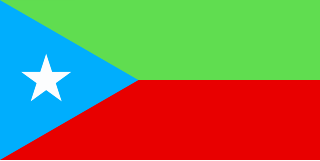
Balochistan is a province of Pakistan. Located in the southwestern region of the country, Balochistan is the largest province of Pakistan by land area but is the least populated one. It is bordered by the Pakistani provinces of Khyber Pakhtunkhwa to the north-east, Punjab to the east and Sindh to the south-east; shares international borders with Iran to the west and Afghanistan to the north; and is bound by the Arabian Sea to the south. Balochistan is an extensive plateau of rough terrain divided into basins by ranges of sufficient heights and ruggedness. It has the world's largest deep sea port, the Port of Gwadar lying in the Arabian Sea.

The Baloch or Baluch are a nomadic, pastoral, ethnic group which speaks the Western Iranic Baloch language and is native to the Balochistan region of South and Western Asia, encompassing the countries of Pakistan, Iran, and Afghanistan. There are also Baloch diaspora communities in neighbouring regions, including in Central Asia, and the Arabian Peninsula.

Sistan and Baluchestan province or Asli Baluchestan is the second largest province of the 31 provinces of Iran, after Kerman province, with an area of 180,726 km2. It is in the southeast of the country, bordering Afghanistan and Pakistan, and its capital is the city of Zahedan.

Nimruz or Nimroz is one of the 34 provinces of Afghanistan, located in the southwestern part of the country. It lies to the east of the Sistan and Baluchestan Province of Iran and north of Balochistan, Pakistan, also bordering the Afghan provinces of Farah and Helmand. It has a population of about 186,963 people. The province is divided into five districts, encompassing about 649 villages.

Gwadar is a port city located on the southwestern coast of the Pakistani province of Balochistan and serves as the capital of the South Balochistan region. The city is located on the shores of the Arabian Sea, opposite to Oman and has a population of over 90,000 according to the 2017 census. It was an overseas possession of the Oman from 1783 to 1958. It is about 120 km (75 mi) southwest of Turbat. The sister port city of Chabahar in Iran's Sistan and Baluchestan provinces is about 170 km (110 mi) to the west of Gwadar. On 2 April 2021, it was declared the capital of the south Balochistan region.

Chābahār is a city in the Central District of Chabahar County, Sistan and Baluchestan province, Iran, serving as capital of both the county and the district. It is a free port situated on the coast of the Gulf of Oman, and is Iran's southernmost city. The sister port city of Gwadar in Balochistan, Pakistan, is located about 170 kilometres (110 mi) to the east of Chabahar.

The Insurgency in Balochistan is an insurgency or revolt by Baloch nationalists and Islamist militants against the governments of Pakistan and Iran in the Balochistan region, which covers the Pakistani province of Balochistan, Iranian province of Sistan and Baluchestan, and Balochistan of southern Afghanistan. Rich in natural resources like natural gas, oil, coal, copper, sulphur, fluoride and gold, this is the largest, least populated and least developed province in Pakistan. Armed groups demand greater control of the province's natural resources and political autonomy. Baloch separatists have attacked civilians from other ethnicities throughout the province. In the 2010s, attacks against the Shia community by sectarian groups—though not always directly related to the political struggle—have risen, contributing to tensions in Balochistan. In Pakistan, the ethnic separatist insurgency is low-scale but ongoing mainly in southern Balochistan, as well as sectarian and religiously motivated militancy concentrated mainly in northern and central Balochistan.
Pashtun diaspora comprises all ethnic Pashtuns. There are millions of Pashtuns who are living outside of their traditional homeland of Pashtunistan, a historic region that is today situated over parts of Afghanistan and Pakistan. While the (erstwhile) Pashtunistan is home to the majority of Pashtun people, there are significant local Pashtun diaspora communities scattered across the neighbouring Pakistani provinces of Sindh and Punjab, particularly in their respective provincial capital cities of Karachi and Lahore. Additionally, people with Pashtun ancestry are also found across India; particularly in Rohilkhand, a region in the Indian state of Uttar Pradesh; and in the Indian states of Gujarat and Rajasthan. Outside of South Asia, significant Pashtun diaspora communities are found in the Arab states of the Persian Gulf, the United States, the United Kingdom, Germany, Iran, Australia, Canada, and Russia.

Balochistan is a historical region in Western and South Asia, located in the Iranian plateau's far southeast and bordering the Indian Plate and the Arabian Sea coastline. This arid region of desert and mountains is primarily populated by ethnic Baloch people.

Chabahar Port is a seaport in Chabahar located in southeastern Iran, on the Gulf of Oman. It serves as Iran's only oceanic port, and consists of two separate ports named Shahid Kalantari and Shahid Beheshti, each of which has five berths. It is only about 170 kilometres west of the Pakistani port of Gwadar.

Baloch nationalism is an ideology that asserts that the Baloch people, an ethnic group native to Pakistan, Iran and Afghanistan, form a distinct nation. The origins of modern Baloch nationalism coupled with the insurgency in Balochistan involving various militant organizations, go back to the period of the partition of British India and subsequent independence of Pakistan, when Kalat, the largest Baloch princely state, acceded to the Dominion of Pakistan.
Konarak is a city in the Central District of Konarak County, Sistan and Baluchestan province, Iran, serving as capital of both the county and the district.
There are or have been a number of separatist movements in Pakistan based on ethnic and regional nationalism, that have agitated for independence, and sometimes fighting the Pakistan state at various times during its history. As in many other countries, tension arises from the perception of minority/less powerful ethnic groups that other ethnicities dominate the politics and economics of the country to the detriment of those with less power and money. The government of Pakistan has attempted to subdue these separatist movements.
The majority of the population of Iran consists of Iranic peoples. The largest groups in this category include Persians and Kurds, with smaller communities including Gilakis, Mazandaranis, Lurs, Tats, Talysh, and Baloch.

Pakistan is one of the world's most ethnically and linguistically diverse countries. The major Pakistani ethnolinguistic groups include Punjabis, Pashtuns, Sindhis, Gujjar, Saraikis, Muhajirs, Balochs, Paharis and Brahuis, with significant numbers of Baltis, Kashmiris, Chitralis, Shina, Kohistanis, Torwalis, Hazaras, Burusho, Wakhis, Kalash, Siddis, Uzbeks, Nuristanis, Pamiris, Hindkowans, Kyrgyz, Turkmen, Uyghurs and other various minorities.

China–Pakistan Economic Corridor (CPEC) is a 3,000 km Chinese infrastructure network project undertaken in Pakistan. This sea-and-land-based corridor is aimed to secure and reduce the passage for China's energy imports from the Middle East by avoiding the existing route from the Straits of Malacca between Malaysia and Indonesia, which in case of war could be blocked and thus hamper the Chinese energy dependent economic avenues. Developing a deep water port at Gwadar in the Arabian Sea and a well built road and rail line from this port to Xinjiang Province in western China would be a shortcut for boosting the trade between Europe and China. In Pakistan, it aims to overcome an electricity shortfall, infrastructural development and modernize transportation networks. Along with shifting it from an agricultural based economic structure to industrial based.
Baloch people in the United Arab Emirates comprise residents of the United Arab Emirates whose ancestral roots lie in Balochistan. The Baloch are one of the oldest migrant groups in the country.
Central Asians in the United States are Americans with ancestry from Central Asia. They include Kazakh, Kyrgyz, Tajik, Turkmen, and Uzbek individuals. People of Afghan, Baloch, and Uyghur descent are also sometimes classified as Central Asians. The United States census does not mention Central Asians under any category.
Baloch people in India are citizens or residents of India who are of Baloch ancestry. They originate from the Balochistan region of neighbouring Pakistan, and are part of the Baloch diaspora.












